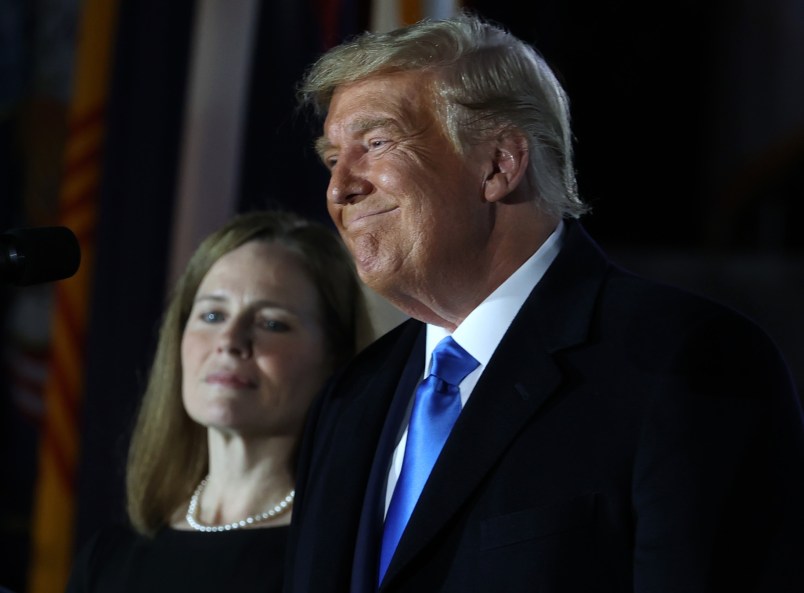Justice Amy Coney Barrett broke with her conservative peers Monday on a part of the majority opinion that will kneecap prosecutors’ ability to make criminal cases against former presidents.
The parts she joined with already made that task very difficult: The majority, including Barrett, walled off conduct umbrellaed under a president’s ill-defined “core constitutional powers” as having “absolute immunity.” His other official acts, the majority found, get “presumptive immunity.” Only unofficial acts can be prosecuted with no immunity at all. Justice Sonia Sotomayor, who wrote the primary dissent, argued that between those first two murky categories, almost no presidential conduct will be left.
Still, the majority, sans Barrett, took another step that will make cases against former presidents (like special prosecutor Jack Smith’s) even more difficult: Non-public evidence pertaining to the protected official acts cannot be admitted during trial to help prove that the unprotected, unofficial ones were crimes.
“Testimony or private records of the President or his advisers probing such conduct may not be admitted as evidence at trial,” Chief Justice John Roberts wrote for the majority.
So not only can prosecutors like Smith not charge official acts — even if they are obvious and egregious crimes — they can’t even use evidence they dug up around them to bolster their case on the unofficial acts.
Barrett disagreed with the majority on that point in her solo concurrence, going so far as to agree with Sotomayor’s dissent.
“The Constitution does not require blinding juries to the circumstances surrounding conduct for which Presidents can be held liable,” she wrote.
She sketched out a hypothetical where a former president had accepted a bribe in exchange for some favor, an “official act.” Under Roberts’ rule, juries would hear about the bribe — but not what the President gave in return.
“Excluding from trial any mention of the official act connected to the bribe would hamstring the prosecution,” she wrote. “To make sense of charges alleging a quid pro quo, the jury must be allowed to hear about both the quid and the quo, even if the quo, standing alone, could not be a basis for the President’s criminal liability.”
Elsewhere in her concurrence, she may have lit a small spark of hope for Smith’s team, which can’t be feeling much of if after reading Monday’s ruling. She flagged a couple charges against Trump that she sees as fair game for prosecution. One of those is Trump’s pressure campaign against state officials to get them to reverse the election results in their states; she specifically cited former Arizona House Speaker Rusty Bowers (R). The second is Trump’s fake electors scheme.
“A President has no legal authority — and thus no official capacity — to influence how the States appoint their electors,” she wrote. “I see no plausible argument for barring prosecution of that alleged conduct.”
She also sided with Sotomayor again, writing that all exercises of the Take Care provision — requiring that presidents “take Care that the Laws be faithfully executed” — do not fall within core executive power, meaning they are not covered by those powers’ absolute immunity. If she can rally other conservative votes on that point, it may be a small winnowing of the immunity former presidents can claim going forward.







Under the Supreme Courts ruling, what restrains President Joe Biden from having Trump shot?
Just saying.
My anxiety is off the charts today.
I used to think Roberts was the most likely of the fascists to side with the honorable three justices on occasional issues (his legacy, you know). I no longer think that. Surprisingly it’s the handmaiden who seems to have the integrity to make admittedly infrequent ventures into judicial sanity.
Chief Pirate Roberts, no matter how much he loves to pretend (in the full sense of the word) to high-minded impartiality, has taken the low road of partisan political advantage over and over and over again. His legacy is really no longer up for serious debate at this point. He is the Roger Taney of our time.
ACB taught constitutional law at Notre Dame, and it’s just possible that she might actually know (and care) about it, at least a bit.
“Testimony or private records of the President or his advisers probing such conduct may not be admitted as evidence at trial,” Chief Justice John Roberts wrote for the majority.